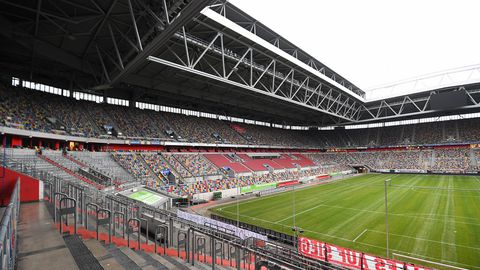The Bundesliga’s plan to return to action is welcome news, but it’s only the first step


In Germany, it seems, the return of sports is imminent.
This week, the head of German soccer’s Bundesliga revealed that his league was positioning itself to recommence competition at the start of May, just a few weeks away.
“We are part of the culture in the country, people long to get back a short piece of normal life, and that could mean the Bundesliga plays again,” Christian Seifert told The New York Times. “This is why we have to play our role here, and that means to support the government and to talk with the government about when we will be able to play again.”
In an interview with @nytimes , Bundesliga CEO says:
* All teams back in Training
* Planning to resume season early May behind closed doors and finish before June 30th
* Maybe No Fans until 2021
* Cost to clubs playing games w/out fans nearly $110 millionhttps://t.co/RkJIeC0pjv— Stu Holden (@stuholden) April 8, 2020
In isolation, Seifert’s comments would appear to be a tremendous boost for sports fans, who, amid the COVID-19 pandemic, have been truly starved of meaningful athletic entertainment.
Yet it is far more complicated than that. Reading into German soccer’s comeback that a more widespread resumption of sporting leagues globally is impending would probably be an inaccurate, and potentially foolhardy, leap.
The coronavirus has struck in different ways, at different pacings and on different timescales everywhere it has spread. As a nation, Germany has managed to keep things under control more effectively than most other countries. Despite having the fifth highest number of infections of any country, its death rate is low, a factor attributed to a comprehensive testing policy.
That reality has enabled German soccer chiefs to move towards restarting their season. Most Bundesliga clubs have nine games remaining. The idea is that getting back underway in May will allow the campaign to be finalized by the end of June, meaning relatively little overall disruption.
As sports fans, we’d be immensely grateful. Even if German soccer, outstanding as it is, isn’t your typical sports fare, it would be real, live, first-class professional sports back on our televisions and cell phones. The communal aspect of the games would be back in our lives, perhaps even amplified, as the entirety of sports fandom would share in the same events — the highs and the lows, the taunting and the celebration. Everything that sports is about, returned.
What a hit!
Sergio Pinto serving up the perfect amount of dip ☄️#BundesligaBangers pic.twitter.com/zNNYzPWp8E
— Bundesliga English (@Bundesliga_EN) April 10, 2020
Elsewhere in soccer, though, there is less optimism. Belgium’s Pro League was cancelled a week ago, and the Euro 2020 championships for national teams has been moved to next year. Spain’s La Liga is hoping for a return after its COVID-19 curve appeared to flatten, but is being responsibly cautious. The English Premier League looks unlikely to resume games until July at the earliest.
In the United States, major sports leagues have been blueprinting alternative scenarios, but must necessarily wait to see what restrictions are imposed by federal and state policies.
The reason the German situation is relevant is because it is an early replicator of the moral, emotional and mental considerations that could at some point play out across the decision-making process elsewhere, for other leagues. Indeed, it would be a mistake to think that what is happening in Germany is purely because of improvements in the coronavirus situation. On Friday, the country recorded its highest single-day death toll since the pandemic began, with 266 people passing away.
Compared to other soccer nations, most German clubs are not owned by massive corporations or wealthy billionaires. A national law mandating that no more than 49 percent of a club organization can be held by commercial interests has ensured fans have retained a say in how organizations operate. Yet it has also put many smaller teams in financial peril, part of the reason why Seifert is so keen to get things going again, as Germany’s situation allows.
But it won’t be normal. Every game will be held behind closed doors for the rest of the season and possibly, Seifert says, the remainder of the year.
Since everything was thrown into flux, America’s sports leagues have put public health first, as they should. The NBA shut down operations when Rudy Gobert tested positive. The NHL and MLS closed their doors. The NCAA tournament was scrapped. The NFL will hold its Draft, but long ago ditched plans for it to be a typical public event and turned it into what will essentially be an elaborate electronic television show instead.
With every passing day, the leagues, especially those that were supposed to have the most meaningful part of their season right now, conscientiously weigh all of the considerations. There are factors of employment and livelihoods to examine, not so much for millionaire players, but for tens of thousands of regular earners whose pay is contingent on sports.
It is heavy stuff, complex and serious and overwhelmingly unprecedented. When German soccer returns, it will be all-mightily welcome, both because it is a high-quality league and an excellent product, and because there is so little else to watch.
But it is too early to anoint it as the start of things getting back to how we knew them. This time is testing us all in ways we never expected, but our patience has to hold for a little longer.









